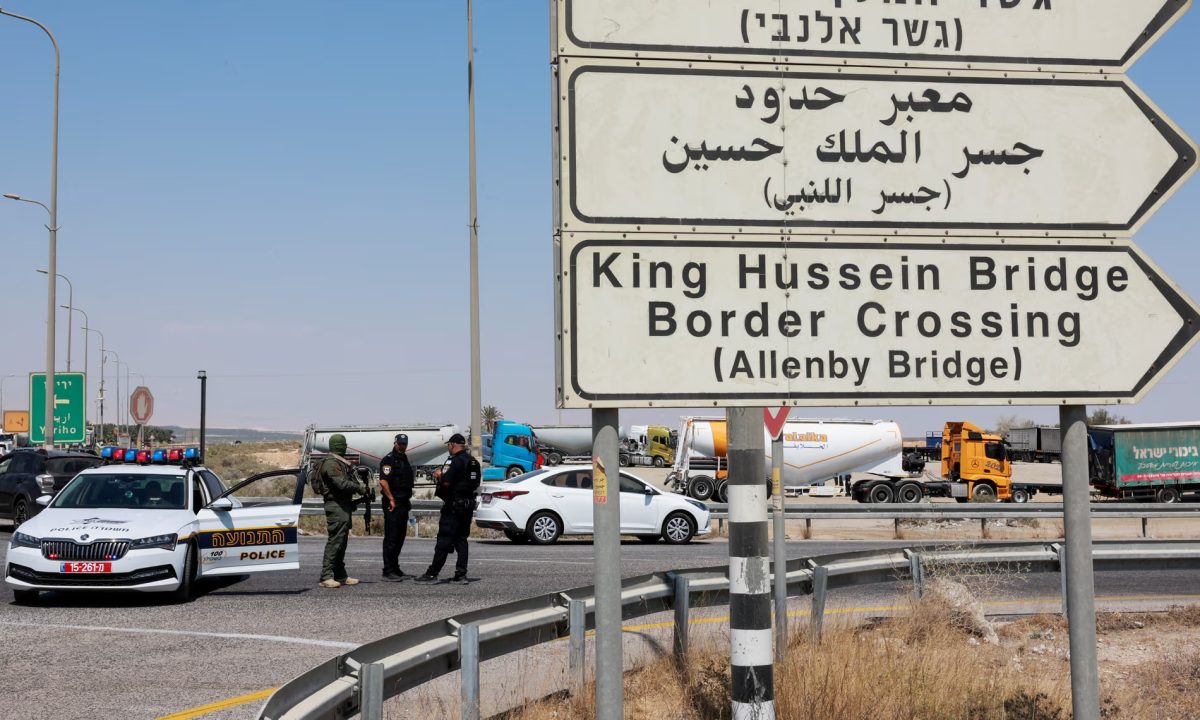Israeli media identified the shooter as Maher Dhiab Hussein al-Jazi, 39, from the southern Jordanian town of Udrah in Maan governorate, a town that supplied troops to fight in the 1948 Battle of Jerusalem.
Jazi is a descendant of Maher al-Jazi, the commander of the Jordanian army in the 1968 “Karameh” battle between Israeli troops and the Palestinian Liberation Organisation (PLO) and Jordanian armed forces.
The Israeli military said Jazi “approached the area in a truck from Jordan, exited the truck, and opened fire at the Israeli security forces operating at the bridge” before he was shot dead.
Three Israelis were pronounced dead at the scene after a military medical team had performed resuscitation efforts, the Israeli military added.
The Israeli manager of the crossing said the three security guards, identified by Israeli media as Yohanan Shchori, Yuri Birnbaum and Adrian Marcelo Podzamczer, were shot at close range by the driver crossing from Jordan.
The shooting took place near an Israel-controlled commercial cargo area, where Jordanian trucks offload cargo entering the West Bank from the kingdom.
Jordan has closed the Allenby Bridge crossing, also known to Palestinians as al-Karamah Bridge, until further notice as authorities investigate the incident, the interior ministry announced.
Israel also closed all three of its land border crossings with Jordan.
Thousands of Jordanians marched on Sunday evening from Al-Husseini Mosque in the old city of Amman to participate in a “martyr’s procession” following the Karameh crossing operation carried out by Jazi.
A large number of Jordanians attended the march, although activists reported that security forces prevented the marchers from bringing in a car equipped with loudspeakers.
“We are surrounded by a murderous ideology led by Iran’s axis of evil,” Prime Minister Benjamin Netanyahu said at the start of a cabinet meeting following the incident.
“In recent days, abhorrent terrorists murdered six of our hostages and three Israel Police officers in cold blood. The murderers do not differentiate between us. They want to murder us all, right and left, secular and religious, Jews and non-Jews, until the last one.”
Prior to the shooting, in comments reported by Al Quds, former Jordanian Prime Minister stated: “The enemy who targeted Palestine is clear that it will target Jordan.”
He added that “every Arab or Muslim, civilian or ruler” who does not show solidarity with Palestinians “is a traitor to his country, to the Arab nation and to his religion”.
Hamas said the attack was a “normal response” to Israeli “crimes”.
A Jordanian border official told Reuters at least two dozen Jordanian truck drivers in the offloading area have been detained by Israel’s military for interrogation.
The crossing, which lies north of the Dead Sea, is the only international entry point for Palestinians from the West Bank that bypasses Israel. It is operated by private security guards and Israeli security forces stationed there.
The attack comes amid mounting tensions between Israel and Jordan over fears of the mass expulsion of Palestinians to the kingdom.
Last month, Jordanian King Abdullah II said that Jordan will “not accept having the region’s future held hostage to the policies of the extremist Israeli government”.
Jordanian Foreign Minister Ayman Safadi denounced Israel as a “rogue state,” warning that the Israeli push for the displacement of Palestinians in Gaza could spark a regional conflict.
Meanwhile, according to Israeli reports, Israel’s longest and traditionally most peaceful border is increasingly becoming a source of concern for Israeli authorities.
In August, report in Maariv claimed that in recent months, over 40,000 people breached the border with Jordan into the West Bank.
Following the report, Yitzhak Wasserlauf, the Israeli minister for the Negev and Galilee, called for a plenary session of the government to discuss what he called “mass infiltration from Jordan” that presents “a real threat to the integrity of the state of Israel”.
“The open borders are used as a channel for smuggling weapons, drugs and dangerous materials, and allow our enemies to infiltrate our territory,” Wasserlauf added.
